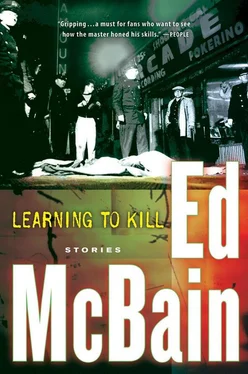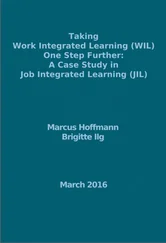The sidewalks seemed to be darker than the gutter, and so she stayed in the middle of the street, looking from side to side as she made her way from the corner, hoping to spot Johnny huddled in one of the doorways.
She was wearing high heels, the shoes she wore at her after-school job in the delicatessen. Her heels clattered on the iron top of a manhole cover, sending a loud clicking into the silent night. She did not look down. She continued walking up the street into the blackness.
Johnny did not hear the clicking of his sister’s heels on the manhole cover above him. Johnny was at the moment listening to another sound. The sound was a squeak at first. He looked down curiously. And then the sound was a scraping, and when he looked this time he saw the glow of two pinpoints of light, and he knew he was looking into a rat’s eyes.
He was scared. He was damned scared. It’s one thing tangling with a human, but it’s another to tangle with a rodent, and Johnny had always been afraid of rats, ever since he’d been bitten by a mouse when they lived over on First Avenue.
He started up the iron brackets set into the sewer wall. He started up rapidly, but the rat was fast, too. He screamed aloud when it leaped onto his foot. He could feel it clinging to his shoe. He shook his foot, climbing up closer to the manhole lid all the time, but the rat clung, and it seemed as if every nerve ending in his body had suddenly moved into his foot. He forgot the pain in his arm, and he forgot the rusted rough edges of the brackets as he climbed closer to the lid. He was aware only of the rat’s weight on his foot, of those glittering, pinpointed eyes down below him.
And then the rat began climbing up the tweed of his trousers, and Johnny screamed again, in real fear this time, fear that crackled into his skull. His head banged against the manhole lid, and he rushed up against it frantically, wedging his shoulders against the flat iron surface, trying to move it. He could not budge the cover. He tried it again, and he felt the rat’s claws digging into his trousers, scraping against his flesh.
He tried to scream, but no sound came from his mouth. He pushed upward with his shoulders again, and this time the lid moved a little, and a fine sifting of dirt trickled down onto the back of his neck. He shoved again, and then tried to brush the rat off his leg. The rat clung, snapping at his hand, drawing fresh blood. Johnny’s breath came fast now, crowding into his throat. He shoved at the cover and it moved aside, and the light from the street splashed down into the manhole, illuminating the rat.
It was a big animal, nine inches or so not counting the tail. It was covered with matted, filthy fur and the sight of the rat made Johnny’s flesh crawl. But the manhole cover was off now and he thrust his head above the surface of the street, not caring about Bugs or his friends, not caring about anything now, wanting only to get away.
The rat pounced onto his arm, its teeth sinking into the sodden bandage. Johnny flipped up onto the asphalt and the rat clung, only now Johnny didn’t have to worry about clinging to an iron bracket. He balled his left fist, terror shrieking inside him, and brought it down on the rat’s head. The rat clung fiercely.
He got to his feet and ran across the street, stopping alongside the brick wall of a building. And then he began battering the bleeding arm against the brick, over and over again, slamming the tenacious rat against the wall.
And at last the rat’s jaws loosened and it fell away to the pavement, a whimpering ball of fur with a long, twitching tail. He did not look down at the rat. He was crying now, crying as he’d never cried in his life. He ran up the street, sobbing and wondering why he’d had to run all his life, all his damn life.
And then he stopped running and fell to the pavement, and blackness closed in on him.
It was Marie who found him ten minutes later as she made her way down the street. It was she who carried him home, half dragging him, half pulling him. It was she who sent for the doctor.
The doctor treated and bandaged his arm, and Johnny slept all that night and through the next day.
Marie and Johnny’s parents were by his bedside when he awoke, and the first thing he said was, “Why do I have to keep running? Why?”
And because they thought he was referring to Angelo’s death, they said, “The police found the killer, Johnny. It’s all right now. It’s all right.”
Only Johnny Trachetti knew that it wasn’t all right, and that maybe it would never be.
This Richard Marsten story was first published as “Murder on the Keys” in the February 1956 issue of Argosy. I don’t know why editors — especially magazine editors — insist on changing good titles to invariably lousy ones. I have always liked this story, and I have always liked my original title for it, which is what appears on it now.
* * *
The state of Florida is a Luger.
You think of it as a broad beaver’s tail jutting out into the Atlantic but it isn’t that at all. There’s a perpendicular bar of real estate on the northern end, spreading west to form the muzzle of a pistol, and the muzzle is narrow and thin in comparison to the broad grip of the gun, the way a Luger tapers down to a narrow, lethal grace. You’ll find Sun City curling down like the trigger of the gun, and if you travel down the western side of the notched grip, you’ll find the Gulf beaches. One of those beaches is called Pass-A-Grille, and it’s as much a part of the Luger as the slide mechanism and the clip.
In Pass-A-Grille that week, they talked of nothing but the weather.
The snowstorm had swept through Ontario and Quebec, rampaged into New York State, and then ripped southward. In Tallahassee, Florida, a surprised citizenry awoke to find sleet and snow and a low temperature of thirty-four degrees — and in Pass-A-Grille, there was a cold, steady rain together with high winds.
People came into the diner with the collars of their coats high, their eyes watery from the angry winds that blew raw off the bay. It was a cold March in Florida, and people looked at the skies and said, “It’ll break tomorrow” — but tomorrow never came.
David Coe watched the skies, too.
David owned a boat. It was a thirty-six-footer and not a yacht, but it had a good engine and it managed to earn its keep. When the weather was good, David carried fishing parties. He could usually get up a good party in Pass-A-Grille. His rates were reasonable and he got all kinds of fishermen — when the weather was good. The weather was not good. The weather was lousy, and he was contemplating a pretty lean week when Leslie Grew came down to the docks.
Grew was a thin man with gold-rimmed spectacles, no more than thirty-eight but with the tired look of a man of seventy. His shoulders were hunched, and he took tentative, birdlike steps as he came down onto the wood planking. He glanced over his shoulder every now and then, almost as if he had a nervous tic. He had thin, sandy-brown hair, and it danced on top of his head, rising and falling with the fresh gusts of wind that whipped off the water. He seemed not to notice the rain. He walked directly to where David was squatting on the deck of the Helen, cleaning out the bait well.
“Mr. Coe?” Grew asked. He had a deep voice, surprising because it came up from such a narrow chest.
“Yes?”
“I want to rent your boat.”
David squinted up at him. He was surprised by the unexpected windfall, but he was also suspicious of a man who wanted to go out in this kind of weather.
“How many in your party, Mr.—”
“Grew,” he supplied, and he looked at David long and hard, as if trying to see whether or not the name meant anything to him. “Leslie Grew,” he added and he kept looking, and David simply nodded because the name meant nothing.
Читать дальше












